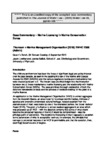The Value of Marine Conservation
| dc.contributor.supervisor | Rodwell, Lynda | |
| dc.contributor.author | Rees, Sian Elizabeth | |
| dc.contributor.other | Faculty of Science and Engineering | en_US |
| dc.date.accessioned | 2012-05-24T08:53:52Z | |
| dc.date.available | 2012-05-24T08:53:52Z | |
| dc.date.issued | 2012 | |
| dc.date.issued | 2012 | |
| dc.identifier | 222915 | en_US |
| dc.identifier.uri | http://hdl.handle.net/10026.1/1005 | |
| dc.description.abstract |
The marine environment provides essential ecosystem services that are critical to the functioning of the earth’s life support system and the maintenance of human well-being. Marine Protected Areas (MPAs) are recognised as being the mechanism though which marine natural capital may be conserved. This thesis focuses on the value associated with marine conservation in a case study area, Lyme Bay, England where a ‘closed area’ was created in 2008. A review of literature spanning 20 years shows that despite sound ecological knowledge of a marine area, the reliance on traditional neo-classical economic valuations for marine spatial planning can obscure other issues pertinent to the ecosystem approach. A further valuation of the marine leisure and recreation industry shows that the industry is of economic significance and that the MPA enables the protection of the most valuable sites but has limited benefits for protecting the full resource base. In terms of ecological value, a ‘service orientated framework’ was developed to enable decision makers to understand the links between benthic species, ecological function and indirect ecosystem services. Results spatially identify which ecosystem services occur and demonstrate the value of the MPA in ensuring delivery of these ecosystem services. In relation to the social value of the MPA the research reveals that support for the MPA is strong amongst the majority of stakeholder groups. Values are expressed as the economic, environmental and social benefits of the MPA. However, there have been clear social costs of the MPA policy and these have been borne by mobile and static gear fishermen and charter boat operators. Each valuation methodology can inform decision making. Though, if ecosystem service valuation is to become a deliberative tool for marine conservation and planning, then there is a need for a larger societal discussion on what activities and trade-offs society considers acceptable. | en_US |
| dc.description.sponsorship | Marine Institute, Devon Wildlife Trust | en_US |
| dc.language.iso | en | en_US |
| dc.publisher | University of Plymouth | en_US |
| dc.subject | Ecosystem Services | |
| dc.subject | GIS | |
| dc.subject | Lyme Bay | |
| dc.subject | Biological Traits Analysis | |
| dc.subject | Ecosystem Function | |
| dc.subject | MPA | |
| dc.subject | Marine Spatial Planning | |
| dc.subject | Service orientated framework | |
| dc.subject | Thematic framework | |
| dc.subject | Decision making, Lyme Bay | |
| dc.subject | Marine Protected Areas | |
| dc.subject | Ecosystem Approach | |
| dc.subject | Marine and Coastal Access Bil | |
| dc.subject | Marine Spatial Planning | |
| dc.subject | Marine Protected Areas | en_US |
| dc.title | The Value of Marine Conservation | en_US |
| dc.type | Thesis | |
| dc.identifier.doi | http://dx.doi.org/10.24382/3983 |
Files in this item
This item appears in the following Collection(s)
-
01 Research Theses Main Collection
Research Theses Main



